| |||||
| Decades: | |||||
|---|---|---|---|---|---|
| See also: | |||||
Events from the year 1870 in Russia .
| |||||
| Decades: | |||||
|---|---|---|---|---|---|
| See also: | |||||
Events from the year 1870 in Russia .
| | This section needs expansion. You can help by adding to it. (July 2016) |
| | This section needs expansion. You can help by adding to it. (July 2016) |
| | This section needs expansion. You can help by adding to it. (October 2021) |
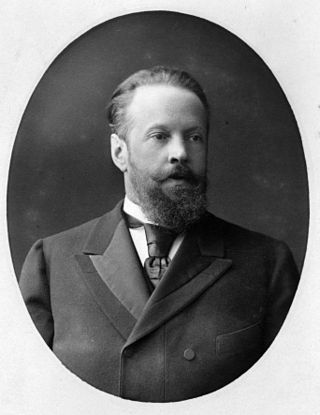
Count Sergei Yulyevich Witte, also known as Sergius Witte, was a Russian statesman who served as the first prime minister of the Russian Empire, replacing the emperor as head of the government. Neither a liberal nor a conservative, he attracted foreign capital to boost Russia's industrialization. Witte's strategy was to avoid the danger of wars.

The Department for Protecting the Public Security and Order, usually called the Guard Department and commonly abbreviated in modern English sources as the Okhrana was a secret-police force of the Russian Empire and part of the police department of the Ministry of Internal Affairs (MVD) in the late 19th century and early 20th century, aided by the Special Corps of Gendarmes.

Bloody Sunday or Red Sunday was the series of events on Sunday, 22 January [O.S. 9 January] 1905 in St Petersburg, Russia, when unarmed demonstrators, led by Father Georgy Gapon, were fired upon by soldiers of the Imperial Guard as they marched towards the Winter Palace to present a petition to Tsar Nicholas II of Russia.
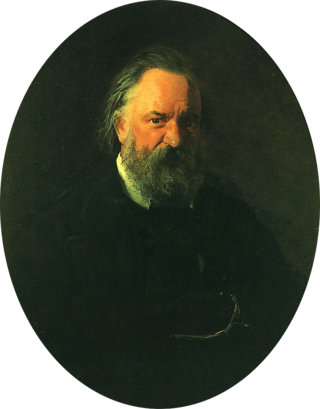
Alexander Ivanovich Herzen was a Russian writer and thinker known as the precursor of Russian socialism and one of the main precursors of agrarian populism. With his writings, many composed while exiled in London, he attempted to influence the situation in Russia, contributing to a political climate that led to the emancipation of the serfs in 1861. He published the important social novel Who is to Blame? (1845–46). His autobiography, My Past and Thoughts, is often considered one of the best examples of that genre in Russian literature.
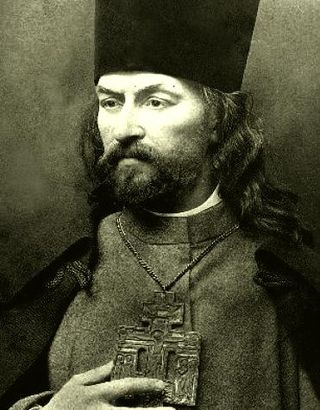
Georgy Apollonovich Gapon was a Russian Orthodox priest and a popular working-class leader before the 1905 Russian Revolution. After he was discovered to be a police informant, Gapon was murdered by members of the Socialist Revolutionary Party. Father Gapon was mainly remembered for leading a peaceful protest for better freedom and living conditions to which the Imperial Army responded by firing upon the crowd.
Yevhen Hapon, also spelled Eugeny Gapon and Ievgen Gapon, better known by his stage name Knjaz Varggoth, is one of the foremost figures in Eastern European black metal and far-right musicians. He is also known to Russians as Yevgeny Gaponovich Gaponovskiy or Genka for short.
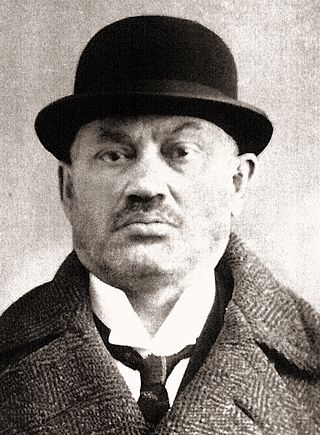
Yevno Fishelevich Azef was a Russian socialist revolutionary who also operated as a double agent and agent provocateur. He worked as both an organiser of assassinations for the Socialist Revolutionary Party and a police spy for the Okhrana, the Russian Empire's secret police. He rose through the ranks to become the leader of the Socialist Revolutionary Party's terrorist branch, the SR Combat Organization, from 1904 to 1908.

Grand Duke Vladimir Alexandrovich of Russia was a son of Emperor Alexander II of Russia, a brother of Emperor Alexander III of Russia and the senior Grand Duke of the House of Romanov during the reign of his nephew, Emperor Nicholas II.

Pinhas Rutenberg was a Russian Jewish businessman, hydraulic engineer and political activist. He played an active role in two Russian revolutions, in 1905 and 1917. During World War I, he was among the founders of the Jewish Legion and of the American Jewish Congress. Later, he immigrated to Mandatory Palestine, and through his connections managed to obtain a concession for production and distribution of electric power and founded the Palestine Electric Corporation, currently the Israel Electric Corporation. A vocal and committed Zionist, Rutenberg also participated in establishing the Haganah, the main Jewish militia in pre-war Palestine, and founded Palestine Airways. He subsequently served as a President of the Jewish National Council.

Mark Andreyevich Natanson was a Russian revolutionary who was one of the founders of the Circle of Tchaikovsky, Land and Liberty and the Socialist-Revolutionary Party. In 1917, he was a leader of the Left Socialist-Revolutionaries, which supported the Bolsheviks during the October Revolution. He was the uncle of Alexander Berkman.
Gapon may refer to:

Yevgeny Eduardovich Gapon is a Russian professional footballer.

Nicholas II, known in the Orthodox Church as Saint Nicholas the Passion-Bearer, was the last Emperor of Russia, King of Poland and Grand Duke of Finland, ruling from 1 November 1894 until his abdication on 15 March 1917. During his reign, Nicholas gave support to the economic and political reforms promoted by his prime ministers, Sergei Witte and Pyotr Stolypin. He advocated modernisation based on foreign loans and close ties with France, but resisted giving the new parliament major roles. Ultimately, progress was undermined by Nicholas's commitment to autocratic rule, strong aristocratic opposition and defeats sustained by the Russian military in the Russo-Japanese War and World War I. By March 1917, public support for Nicholas had collapsed and he was forced to abdicate, thereby ending the Romanov dynasty's 304-year rule of Russia (1613–1917).
Jovan Grković, nicknamed Gapon (Гапон) was a former Serbian Orthodox monk who joined the Serb guerrilla (chetniks) in the Macedonian Struggle (1902–1912).

Alexander II was Emperor of Russia, King of Poland and Grand Duke of Finland from 2 March 1855 until his assassination in 1881. Alexander's most significant reform as emperor was the emancipation of Russia's serfs in 1861, for which he is known as Alexander the Liberator.

Pargolovo is a municipal settlement in the Vyborgsky District of Saint Petersburg, Russia. Until the late 20th century, it was the city's northern suburb. The name derives from Parkola, a Karelian placename. Its population in 2010 was 15,852.
Events from the year 1905 in Russia.
Events from the year 1915 in Russia.

Vera Markovna Karelina was a Russian labour activist and revolutionary, one of the leaders of the Georgy Gapon's Assembly of Russian Factory and Mill Workers of St. Petersburg and the Bloody Sunday procession.
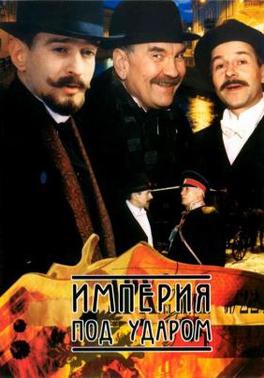
Empire under Attack is a 12-episode 2000 Russian miniseries, about the confrontation of the Security Department and the SR Combat Organization at the beginning of the 20th century.
![]() Media related to 1870 in Russia at Wikimedia Commons
Media related to 1870 in Russia at Wikimedia Commons